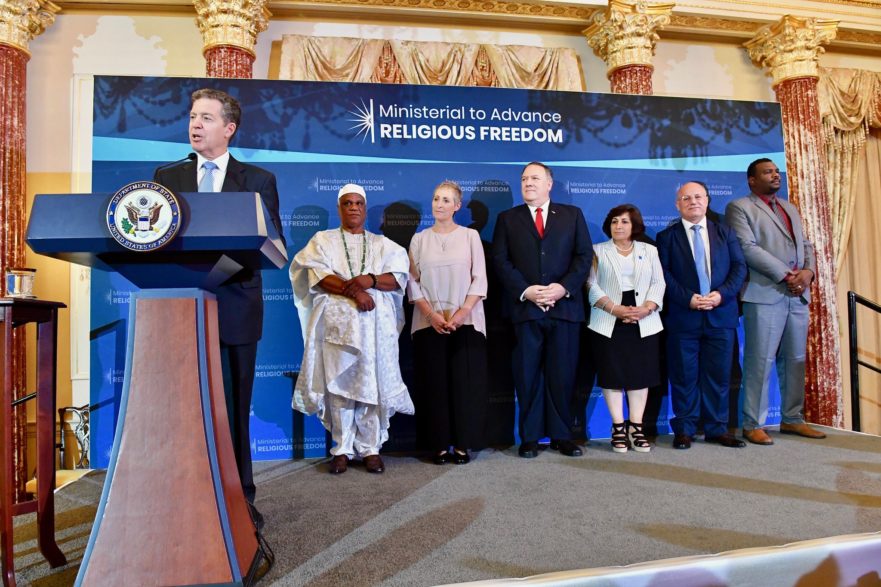The United States recently convened the second Ministerial to Advance Religious Freedom, the largest human rights gathering ever held at the State Department. Government, religious and civil society leaders from 106 countries discussed challenges facing religious freedom, and identified means to address religious persecution and discrimination worldwide. The diverse group focused on concrete outcomes that reaffirm international commitments to promote religious freedom and produce positive change.
During the historic event, 900+ attendees were moved by stories shared by 23 survivors or relatives who have suffered religious persecution around the world. And the State Department recognized six men and women who have stepped up in their communities to defend and advance freedom of religion or belief by presenting them with the first-ever international religious freedom awards. Here are the awardees who are building bridges and protecting vulnerable religious minorities:
- Mohamed Yosaif, Sudanese Human Rights Initiative Co-founder. Mohamed Yosaif has dedicated his work to promoting the establishment of the rule of law and advocating for legal reform in Sudan. A member of Sudan’s Muslim majority, Mohamed leads and develops advocacy campaigns to strengthen legal protections for minority religious communities and to end the government’s property confiscations targeting religious minorities.He has organized trainings on human rights and journalism, women’s rights, and rights awareness for young Sudanese citizens. Mohamed has been repeatedly jailed for his work as a human rights lawyer. Most recently, he was detained for five months, from December 2018 until he was freed by peaceful protesters from inside prison during the recent uprising on 11 April 2019.
- Imam Abubakar Abdullahi of Nigeria. The Imam has lived in Nghar for 60 years and led the Muslim community through the mosque, which was built on land provided by the Christian community.His lifelong commitment to interfaith understanding and peace was demonstrated when he and his congregation heard gunshots and went outside to see members of the town’s Christian community fleeing. Instinctively, the Imam ushered 262 Christians into the mosque and his home next to the mosque. The Imam then went outside to confront the gunmen and he refused to allow them to enter, pleading with them to spare the Christians inside, even offering to sacrifice his life for theirs. [Abdullahi was unable to attend the award ceremony.]
- Ivanir dos Santos, an Afro Brazilian activist, academic, and faith leader. Mr. Santos’ advocacy to protect the freedoms and rights of members of religious communities in Brazil includes launching the Center for Marginalized Populations – a nongovernmental organization focused on combating racial discrimination and promoting rights of members of minority groups; launching the Commission to Combat Religious Intolerance – an organization comprising representatives from different religious groups, members of civil society, the police, and public prosecutor’s office who document cases of religious intolerance and assist victims; and spearheading the first “Walk in Defense of Religious Freedom” in Rio de Janeiro which calls for an end to religious intolerance, the building of bridges, and the promotion of freedom and understanding.
- William and Pascale Warda of Iraq. William and Pascale are the co-founders of Hammurabi Human Rights Organization (HHRO), a nonprofit, apolitical organization that monitors and reports on human rights violations in Iraq, launches advocacy campaigns related to human rights violations, and provides humanitarian assistance following instances of violence.HHRO was one of the first organizations to document ISIS’ atrocities against Yazidi and Christian women, girls, and members of other minorities. Pascale, President of HHRO, has served as the Minister of Migration and Displacement in the Iraqi Interim Government, head of the Assyrian Women’s Union, co-founder of the Iraqi Women’s Center for Development in Baghdad, and as one of only six women in the 32-member interim Iraqi Council of Ministers. William currently works as the Public Relations Officer of HHRO and the head of the Alliance of Iraqi Minorities Network (AIM). He has been active in helping preserve the historical identity of religious minorities following the rise of ISIS.
- Salpy Eskidjian Weiderud of Cyprus. A grandchild of Armenian refugees, Salpy is an architect and Executive Director of an unprecedented peacebuilding initiative in Cyprus known as the Religious Track of the Cyprus Peace Process, which operates under the auspices of the Embassy of Sweden. For almost 30 years, Salpy has worked with faith-based institutions in Europe and the Middle East to promote interfaith understanding. She has been at the forefront of initiating and coordinating ecumenical and interfaith programs regionally and globally on religious freedom and human rights, disarmament, nonviolence, conflict transformation and peacebuilding.
“These individuals risked their own reputation, their personal comfort, their own well-being, and in some cases even their lives to help strangers, many of whom practice faiths that are different from their own” said Secretary Pompeo during the awards ceremony. “I hope that, through these awards, we inspire others to do their part.”
The world needs more ordinary citizens doing extraordinary things to protect and advance religious freedom.
Take Action
- Learn more about the second Ministerial to Advance Religious Freedom.
- Read the full biographies of the 2019 awardees
- Join a campaign or initiate your own. Learn more here.
Photo caption: International Religious Freedom Ambassador Sam Brownback delivers remarks at the 2019 International Religious Freedom Awards ceremony at the U.S. Department of State in Washington, D.C., on July17, 2019. [State Department photo by Michael Gross/ Public Domain]

